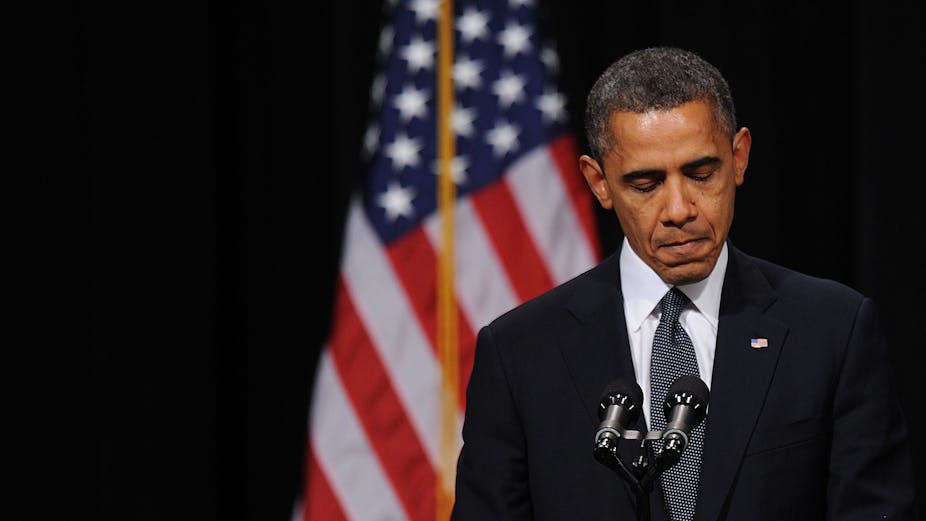Are we really prepared to say that we’re powerless in the face of such carnage, that the politics are too hard? Are we prepared to say that such violence visited on our children year after year after year is somehow the price of our freedom? – President Barack Obama at a vigil in Newtown, Connecticut.
An Onion headline accurately describes how many Americans have been feeling these last few days: “Fuck Everything, Nation Reports”. Not even the fact that there were six mass shootings earlier this year, including one in a cinema and one in a place of worship, could blunt the horror of a massacre in an elementary school. Friday, December 14, 2012 was probably the most nationally traumatic day for the United States since 9/11.
At this point, it is worth recounting some of the civil liberties Americans have given up since 9/11. The PATRIOT Act enabled the federal government to eavesdrop on citizens and intercept their emails. The Department of Homeland Security has devised increasingly invasive procedures for anyone who wants to get on a plane. As of this year, US citizens can be legally assassinated by their own government.
Apart from the occasional threat of an airport uprising, Americans have placidly accepted all this as the “new normal”. With the debatable exception of the Fort Hood massacre, there has been no terrorist attack on US soil in more than a decade, but terrorism continues to provide justification for new violations of civil liberties.
The contrast between this response and the response to mass shootings is remarkable. For a long time, both governments and citizens have seemed prepared to accept that a gun massacre – or a string of them – is no reason to violate the rights of gun owners. This includes the right to own and stockpile semi-automatic weapons whose only purpose is killing large numbers of people.
The National Review’s Robert VerBruggen has explained why Americans need semi-automatics. He wrote that they are “especially helpful” for hunting targets that are running. They make target shooting “more efficient and enjoyable”. And while he conceded they are not usually necessary for self-defence, according to VerBruggen a semi-automatic is “unquestionably helpful in the event of a shootout”.
These are the “freedoms” that semi-automatic owners refuse to give up.
But now, for the first time, it appears that Barack Obama wants to do something about gun control. His Connecticut speech was understandably vague about the details, but it seems he is abandoning his traditional excuse that “the politics are too hard”.
However, the politics are exceedingly hard.
Any gun control legislation, such as Senator Dianne Feinstein’s proposal to reinstitute Clinton-era bans on assault weapons and enlarged magazines, must get through the Republican-controlled House as well as the Democratic Senate, and be approved by the President. There may well be Republicans who are open to gun control measures, but they risk political suicide if they side with Democrats to support them.
Before every election and primary race, the National Rifle Association publishes “grades” for every candidate based on their previous votes for and statements on gun rights. Any Republican congressman who breaks with party orthodoxy on gun rights is likely to face an NRA-backed primary challenge from a candidate with absolutist credentials. In the past four years, Republicans have found that no incumbent is safe from primary challenges. This is particularly difficult for members of the House, who need to get re-elected every two years.
This is why it is hard to be confident that meaningful gun control can be implemented in the next two years.
Another obstacle is the impracticality of banning weapons that tens of millions of Americans already own. There is also the real possibility of lethal confrontations between law enforcers and gun owners who fear that an assault weapons ban will be the first stage in a plot to deprive them of all their rights.
But there will never be a better moment than this to attempt gun control. Even after an event as horrific as this, public attention tends to fade, leaving the debate in the hands of the well-organised minority who believe that nothing should infringe the right to own assault weapons.
The political courage required to act now will need to be much greater, and much more widespread, than anything we have seen before.

